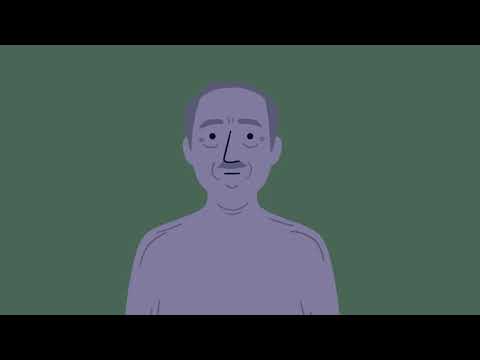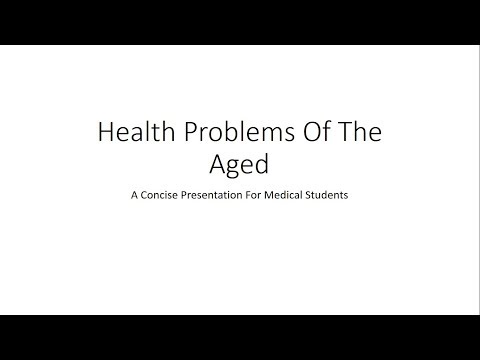The Physical Health of the Elderly: What You Need to Know
Contents [show]
The elderly are a growing population and with age comes an increased risk of developing chronic health problems As our loved ones age, it’s important to be aware of the changes in their health and what we can do to help them maintain their physical health.
Checkout this video:
The physical health of the elderly: an overview
As we get older, our bodies go through a lot of changes. These changes can sometimes be subtle, and we may not even notice them. But they can also have a significant impact on our health and well-being.
It’s important to be aware of these changes so that we can take steps to protect our health. This is especially true for older adults, who are more likely to experience age-related health problems
There are a number of factors that can contribute to the physical decline of older adults. These include:
* decreased muscle mass and strength
* reduced bone density
* decreased flexibility and mobility
* reduced skin elasticity
* changes in organ function
These changes can lead to a number of health problems including:
* Falls: Falls are a leading cause of injury in older adults. They can cause serious injuries, such as hip fractures and head trauma.
* Chronic pain: Age-related conditions such as osteoarthritis can cause chronic pain. This can lead to reduced mobility and independence.
* frailty: Frailty is a condition characterized by weakness, weight loss and low energy levels. It increases the risk of falls and other injuries.
* Alzheimer’s disease: Alzheimer’s is the most common type of dementia, a condition that causes memory loss, confusion, and other cognitive problems. It affects more than 5 million Americans over the age of 65.
The most common health problems faced by the elderly
As people age, their bodies change and they become more vulnerable to disease and injury. The most common health problems faced by the elderly are:
-Arthritis
-Cancer
-Heart disease
-Stroke
-Osteoporosis
-Alzheimer’s disease
The importance of exercise for the elderly
Many older adults do not get enough exercise, and this can lead to a decline in their physical health. Exercise is important for the elderly because it helps to improve their strength, flexibility, and balance. It can also help to reduce the risk of falls and other injuries.
Some older adults may be hesitant to exercise because they are afraid of injuries or theydo not feel like they are capable of doing it. However, there are many ways that older adults can get started with an exercise program that is safe and effective for them.
The importance of a healthy diet for the elderly
As we age, our bodies go through a lot of changes. One area that is especially affected is our digestive system. The elderly are more likely to suffer from constipation, diarrhea, and other gastrointestinal problems. This is why it is so important for them to maintain a healthy diet.
There are a few things that the elderly need to keep in mind when it comes to their diet. They should make sure to eat plenty of fiber-rich foods, drink plenty of fluids, and avoid foods that are high in fat and sugar. These simple dietary changes can make a big difference in their overall health.
The importance of staying hydrated for the elderly
As we age, our bodies become less efficient at using and managing water. This can lead to dehydration, which can in turn cause a host of other problems. That’s why it’s so important for the elderly to stay properly hydrated.
Dehydration can cause fatigue, weakness, lightheadedness, and constipation. It can also exacerbate existing conditions such as kidney disease and heart failure. In extreme cases, it can lead to seizures, coma, and death.
There are a few things that can contribute to dehydration in the elderly:
– Medications: Some medications (diuretics, laxatives, anticholinergics) can increase the risk of dehydration by causing increased urine production or decreased sweat production.
– Decreased thirst sensation: As we age, we may not feel as thirsty as we once did. This means we may not drink enough fluids even when we’re thirsty.
– Illnesses: Some illnesses (e.g., diarrhea, vomiting) can also lead to dehydration.
To stay properly hydrated, the elderly should drink eight 8-ounce glasses of water per day or more if they are active or live in a hot climate. If you are having trouble drinking that much water, you can also eat foods that are high in water content such as fruits and vegetables.
The importance of getting enough sleep for the elderly
As we age, it becomes more and more important to get enough sleep. Sleep helps our bodies repair and rejuvenate, and it is essential for good physical health. Unfortunately, many elderly people do not get enough sleep. This can lead to a variety of problems, including increased risk for falls, heart disease, stroke, and cognitive decline.
There are a few reasons why the elderly may not be getting enough sleep. Many have chronic medical conditions that can cause pain or discomfort that makes it difficult to fall asleep or stay asleep through the night. Others may be taking medications that have side effects that interfere with sleep. And finally, as we age, our bodies simply don’t produce as much of the hormone that helps us sleep, making it harder to fall asleep and stay asleep.
If you are an elderly person who is not getting enough sleep, there are things you can do to improve the situation. Talk to your doctor about your sleep difficulties and see if there are any changes you can make to your medication regimen that might help. Make sure you are following good sleep hygiene practices, such as keeping a regular sleep schedule and avoiding caffeine and alcohol before bedtime. And finally, consider talking to a sleep specialist about other ways to improve yoursleep.
The importance of managing stress for the elderly
It’s no secret that stress can take a toll on our physical health, but did you know that this is especially true for seniors? According to the mayo clinic chronic stress can lead to a number of health problems in older adults, including high blood pressure, heart disease, and problems with memory and sleeping.
What’s more, the elderly are also more likely to suffer from conditions like anxiety and depression, which can further compound the effects of stress. That’s why it’s so important for seniors to find healthy ways to manage their stress levels.
There are a number of ways to do this, but some of the most effective include exercise, relaxation techniques like yoga or meditation, and spending time with friends and loved ones. If you’re concerned about a loved one who is struggling to cope with stress, be sure to talk to their doctor about ways to help them manage it.
The importance of seeing a doctor regularly for the elderly
It’s no secret that as we age, our bodies change. We may not be able to do the things we used to do, and we may be more susceptible to illness and injury. That’s why it’s so important for the elderly to see a doctor regularly.
As we age, our risk of chronic disease increases. According to the Centers for Disease Control and Prevention (CDC), 75% of Americans over the age of 65 have at least one chronic condition, and 50% have two or more. Chronic diseases like heart disease, stroke, cancer, diabetes, and arthritis are the leading causes of death and disability in the United States They are also costly: Chronic diseases account for more than 75% of all healthcare costs in the United States.
Regular checkups can help your doctor catch chronic diseases early, when they are easier to treat. Seeing your doctor regularly can also help you stay healthy by allowing you to get vaccinations against illnesses like influenza (the flu) and pneumonia.
If you are an elderly American, it’s important to see a doctor at least once a year for a routine checkup. You should also see a doctor if you have any concerns about your health. Don’t wait until you are sick to see a doctor – by then it may be too late.
The importance of having a support system for the elderly
As people age, they become more susceptible to a wide variety of health problems. The natural aging process can cause changes in bones, joints, muscles, and organs that can make it difficult to participate in activities that were once easy. Additionally, many elderly individuals live with chronic health conditions that require ongoing management. These conditions can include diabetes, heart disease, arthritis, and dementia.
For these reasons, it’s important for the elderly to have a strong support system in place. Family members and close friends can provide vital assistance with day-to-day tasks, transportation, and other needs. In addition, there are many professional organizations that offer support services for the elderly. These organizations can help with everything from medical care to financial planning.
No matter what type of support system is in place, the most important thing is that the elderly individual feels loved and valued. With the right support in place, the elderly can maintain their health and enjoy a high quality of life.
The importance of taking care of oneself for the elderly
Self-care is important at every stage of life, but it’s especially crucial for seniors. As we age, our bodies become more vulnerable to illness and injury, and our ability to heal decreases. That’s why it’s so important for seniors to take care of themselves and stay healthy.
There are a number of things seniors can do to stay healthy and active. Eating a nutritious diet, getting regular exercise, and getting enough sleep are all important for maintaining physical health. Seniors should also see their doctor regularly for checkups and screenings.
It’s also important for seniors to take care of their mental health Staying socially active and engaged in activities that are enjoyable can help reduce stress and promote a sense of well-being. Seniors should also pay attention to their emotional health, and seek help if they are feeling depressed or anxious.
Taking care of oneself is not always easy, but it’s essential for maintaining good health as we age. With a little effort, seniors can enjoy a high quality of life well into their golden years.





